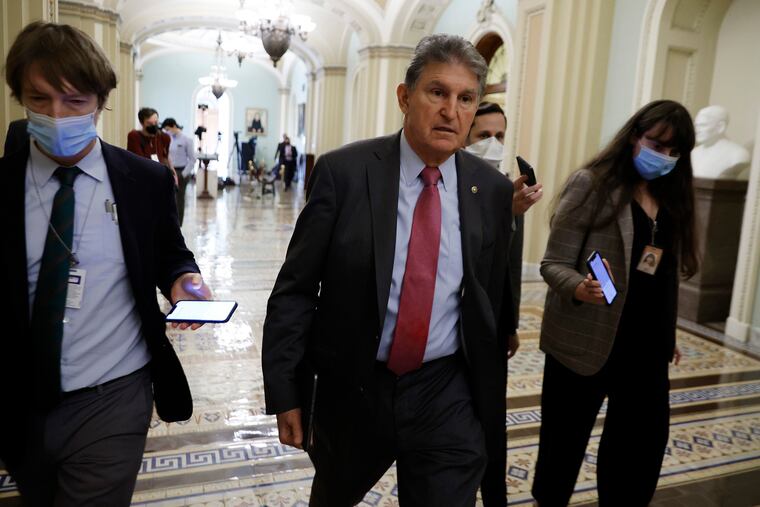Manchin’s offer to Biden on spending bill included pre-K, climate money, Obamacare expansion — but no child tax credit
The West Virginia Democrat tried to pare back a tax and spending package, stripping out pieces the White House wanted to keep.

WASHINGTON — Sen. Joe Manchin, D-W.Va., last week made the White House a concrete counteroffer for its spending bill, saying he would accept a $1.8 trillion package that included universal prekindergarten for 10 years, an expansion of Obamacare, and hundreds of billions of dollars to combat climate change, three people familiar with the matter said.
But Manchin’s counteroffer excluded an extension of the expanded Child Tax Credit the administration has seen as a cornerstone of President Joe Biden’s economic legacy, the people said, an omission difficult for the White House to accept in the high-stakes negotiations. The people spoke on the condition of anonymity to discuss the closed-door deliberations.
Manchin’s private proposal to the White House — the details of which have not been previously reported — was made just days before a spectacular public collapse in negotiations between the White House and the West Virginia senator, marked by bitter and personal recriminations that left the status of the talks unclear.
The White House was weighing how to respond to Manchin’s proposal last week when on Sunday he told Fox News that he would be unable to support the current version of Democrats’ Build Back Better agenda. White House press secretary Jen Psaki publicly called Manchin’s credibility into question a few hours later, saying his comments “are at odds with his discussions this week with the President, with White House staff, and with his own public utterances.” On Monday, Manchin again responded by criticizing White House staff for poisoning the negotiations.
Spokespeople for the White House and Manchin declined to comment.
The breakdown of negotiations threatens to seriously damage Biden’s presidency, and deprive Democrats of what they have characterized as a once-in-a-generation opportunity to combat climate change and remake the U.S. economy.
» READ MORE: Chuck Schumer vows Senate vote on Build Back Better legislation despite Joe Manchin’s opposition
But it remains possible that the administration and Manchin could still reengage in talks, as common ground remains between the sides. While the precise details of Manchin’s offer remain unclear, it adheres to his repeated demand that Democrats fund for 10 years its economic programs — rather than reduce their top line cost by only funding them for a few years, people familiar with the matter said.
Manchin’s counteroffer, for instance, included funding universal pre-K for 10 years, rather than partially financing the measure for a few years. Manchin has long been public about his support of prekindergarten education.
On climate change, Manchin backed supporting a scaled-back version of what Democrats had sought — between $500 billion and $600 billion.
Despite Manchin’s support for hundreds of billions in climate-related spending, these negotiations could still prove fraught as Manchin continues to have major disagreements about the substance of the new climate policies pushed by Democrats. Manchin reiterated some of these concerns in his statement on Sunday, arguing the bill could increase U.S. dependence on foreign supply chains by transitioning America off fossil fuels too quickly. On Monday, he also reiterated concerns that the bill would subsidize electric cars for too many affluent families.
Manchin’s offer also included extending the expansion of the Affordable Care Act approved by Democrats earlier this year — a health care measure that has been a top priority of House Speaker Nancy Pelosi, D-Calif.
Despite these potential areas of compromise, Manchin’s rejection of the expanded Child Tax Credit would represent an extraordinarily difficult condition for the administration to support.
The White House has repeatedly argued that its one-year expansion of the existing expanded child benefit, approved by Democrats in March as part of Biden’s stimulus, has dramatically reduced child poverty and improved the well-being of millions of poor families. If that program expires at the end of this month —— as it now appears likely to — then child poverty could move higher in 2022 in the months before the midterm elections.
In her statement on Sunday, Psaki said that Manchin’s offer to the White House was of the “same size and scope as the President’s framework” that the administration released in October. The statement said that “while that framework was missing key priorities, we believed it could lead to a compromise acceptable to all.” Psaki’s statement then called on Manchin to defend the potential termination of the Child Tax Credit.
“Maybe Senator Manchin can explain to the millions of children who have been lifted out of poverty, in part due to the Child Tax Credit, why he wants to end a program that is helping achieve this milestone,” Psaki’s statement on Sunday said.